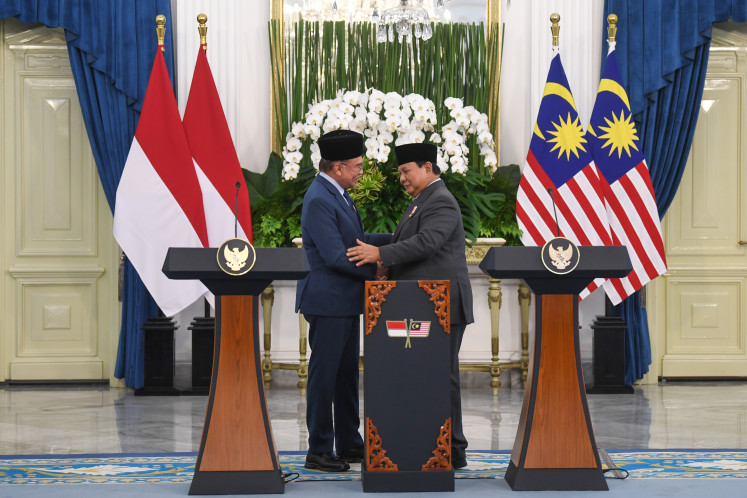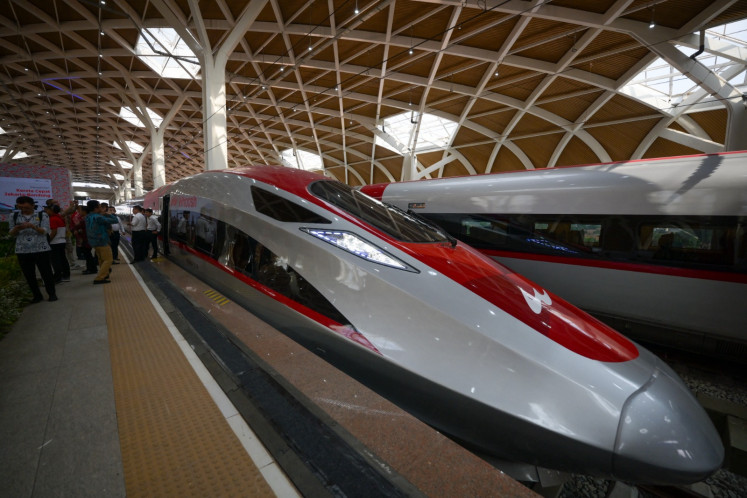Popular Reads
Top Results
Can't find what you're looking for?
View all search resultsPopular Reads
Top Results
Can't find what you're looking for?
View all search resultsBiotech crops still viewed with suspicion
Biotechnology can help Indonesia cope with potential food crises caused by climate abnormalities or pests, but it remains underdeveloped due to unclear regulations and suspicion about its safety
Change text size
Gift Premium Articles
to Anyone

B
iotechnology can help Indonesia cope with potential food crises caused by climate abnormalities or pests, but it remains underdeveloped due to unclear regulations and suspicion about its safety.
It can play a key role in reducing the country’s dependence on imported staple commodities as it can produce higher-yielding crops that are far more resistant to climate-related problems, such as drought, and plant diseases and insects.
Antonius Suwanto, a professor of microbiology and molecular genetics from the Bogor Institute of Agriculture (IPB), said recently that understanding of biotechnology in the country remained low despite the fact that it had strong potential to address challenges of global food security by delivering not only higher-yielding crops but also more sustainable agronomics practices. “Biotechnology is an important technology that can improve our food security. It’s not the only solution but it is the most powerful tool,” he told a media briefing on biotechnology held by Monsanto Indonesia.
Amid the widespread scarcity of food caused by, among other things, crop failure, future crop technologies appeared to show a promise as a means of ensuring food security. Further food crises might occur in the absence of suitable crop technologies delivered to achieve enhanced productivity, higher-yielding crops and sustainable production.
“Developing genetically modified organisms [GMOs] is the only way to achieve good crop yields without harming biodiversity,” said Antonius. Despite global efforts to develop biotech crops, however, few scientists considered biotechnology a suitable alternative technology in developing staple commodities in the country.
“Many of us still consider GMO-based agricultural products unsafe and even harmful to the environment. We also consider that producing transgenic crops will only make farmers jobless and poorer as they are associated with being part of the greediness of multinational companies,” Antonius said, adding that some communities even doubted whether GMO-based crops were halal.
Biotechnology is genetic modification carried out through DNA technology. By modifying a specific gene of a corn variety, for example, scientists may develop higher yielding corn, or other crops, that are more resistant to insects and herbicides. Thus, biotechnology can help reduce harmful effects of pesticides, improving farmers’ quality of life.
Data show that over the past 15 years, biotech farmland increased to 350 million hectares in 2010 from 1.7 million hectares in 1996. More than 15 million farmers worldwide grew biotech crops, mainly canola, cotton, corn and soybean, in 2010.
Still, Monsanto and other biotech crop manufacturers in Indonesia remain in limbo due to the regulatory obstacles they face in developing transgenic products. In 1997, transgenic cotton was first tried out in Indonesia. In 2003, however, Monsanto decided to stop its business activities in developing transgenic cotton in South Sulawesi due to a seemingly highly restrictive and somewhat unclear regulatory environment on biotechnology.
Monsanto Indonesia corporate affairs official Herry Kristanto said the company could not sustain its transgenic cotton business. “We acquired only a temporary permit on variety release, forcing us to apply for a new permit on variety release every year,” he said, giving one example of regulatory obstacles the company has faced.
“Technologically, biotech crops face no problems, but many existing regulatory obstacles remain,” he added.
The company managed to acquire business permits for only seven regencies, namely Bone, Bulukumba, Gowa, Jeneponto, Soppeng, Takalar and Wajo, rendering its business impractical. “Farmers from outside those seven regencies could not use our transgenic cotton seeds whereas the seeds could bring significant economic advantages for them as they were insect resistant,” said Herry.
Developing more biotechnology products is imperative due to the increasing world population, which is projected to reach 9 billion people by 2050. Amid continuous increases in global food demand, however, arable land per capita continues to decline.
“We need to improve technology-based farming tools and agricultural products such as seeds, crop protection and biotechnology not only to meet the world’s growing food needs but also to conserve natural resources and protect the environment,” said Monsanto Indonesia regulatory affairs official Yovita Sutanto.
Since its establishment in 1996, Monsanto, a US-based company focusing on agriculture, has developed agriculture-based research, including biotechnology and plant breeding, and agronomic practices improvements in 29 countries, employing 15.4 million farmers who work on an accumulative 148 million hectares of land.
“The safety of our products should not be an issue as we spend at least US$1.2 billion to develop each product with a development period spanning eight to 10 years,” Yovita said.









